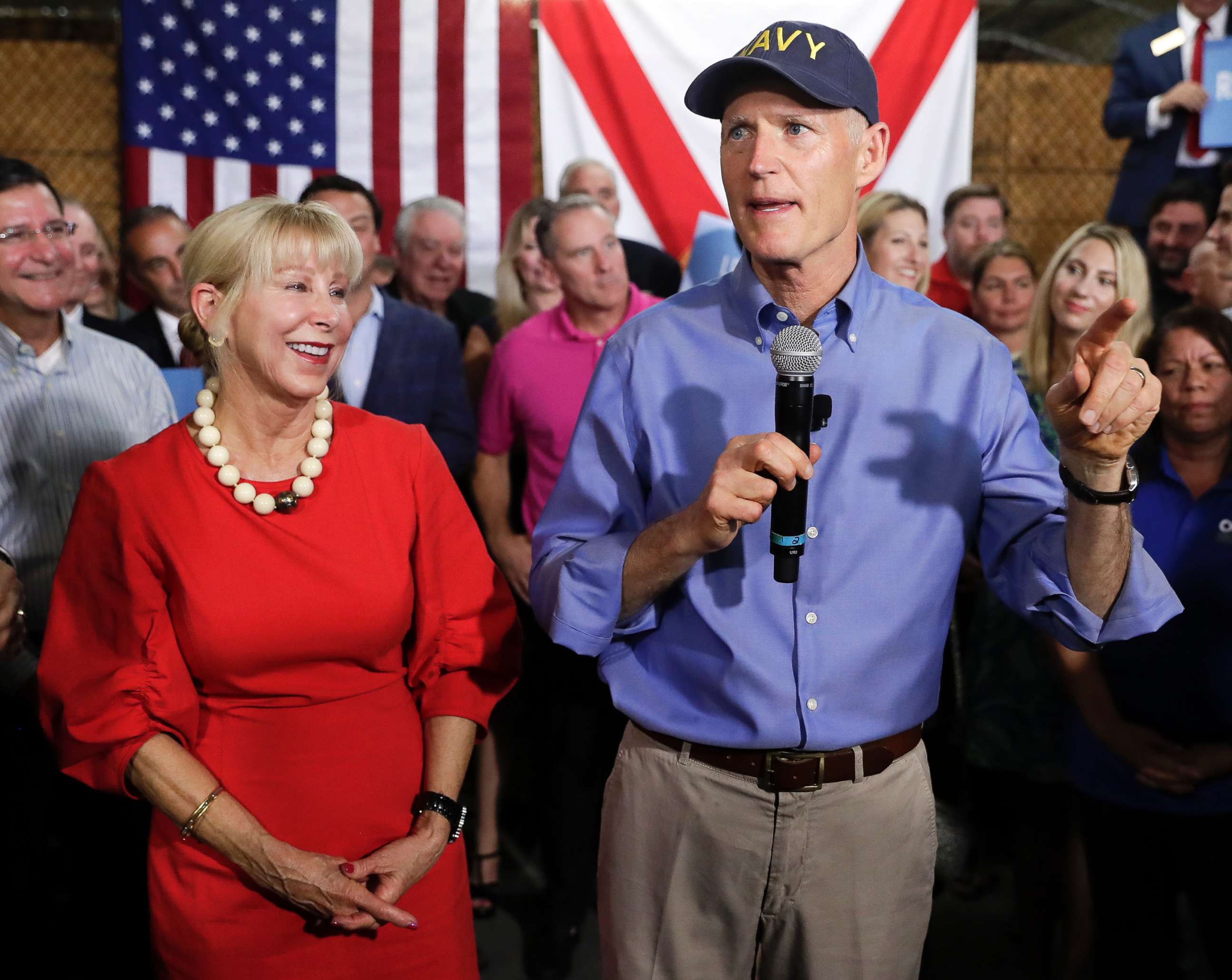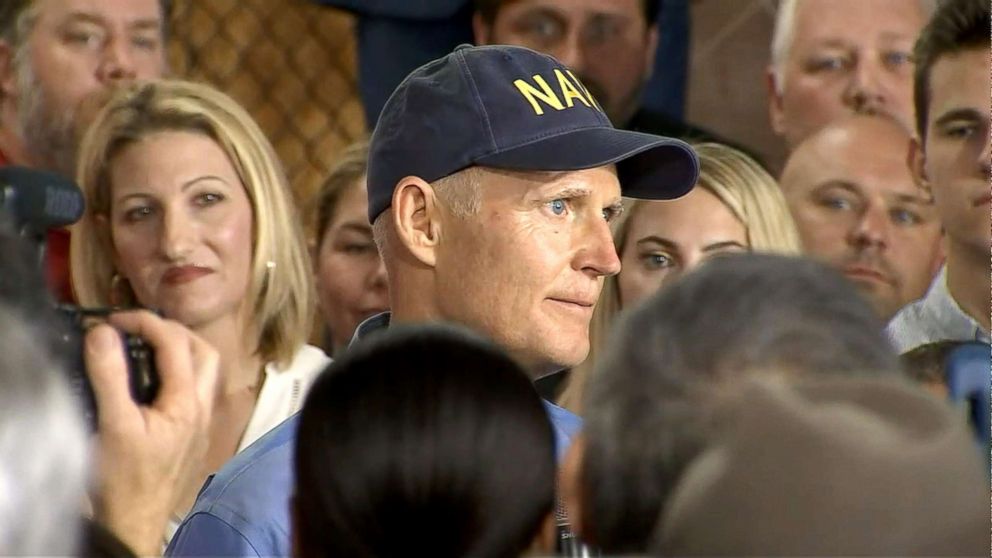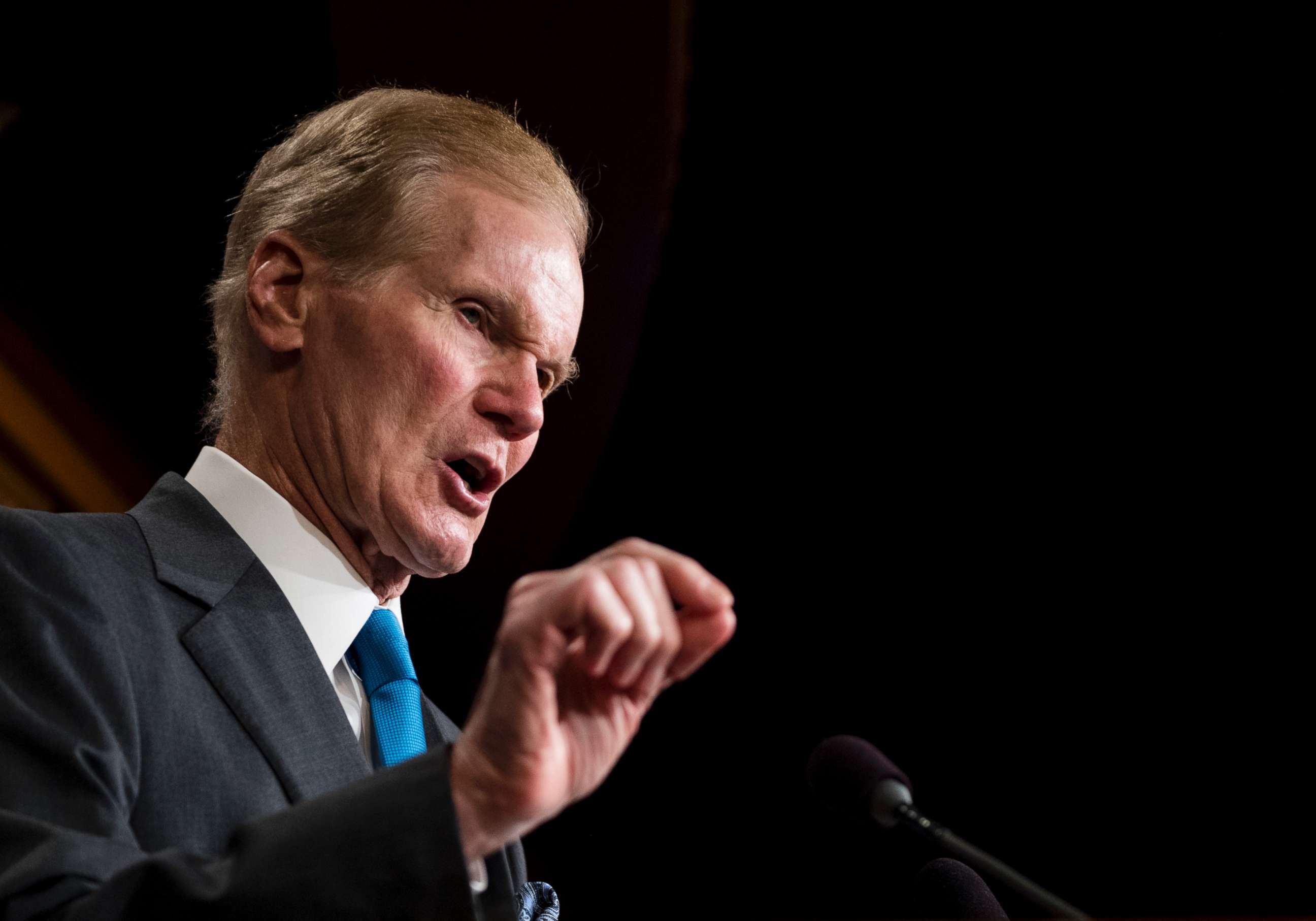Florida Gov. Rick Scott enters Senate race, setting up expensive challenge to Democrat Bill Nelson
The race could determine which party controls the U.S. Senate next year.
Florida Gov. Rick Scott announced his challenge to incumbent Democratic Sen. Bill Nelson on Monday, setting up an epic election battle that could help determine which party controls the U.S. Senate.
“This is going to be a lot of fun,” Scott said in a video on his Facebook page.
The race is expected to be one of the most expensive in election history.
Not only is Florida an expensive state in which to run a campaign – given its size and its pricey TV market – but Scott has the personal wealth to invest in the race. He put $83 million of his own money into his two gubernatorial campaigns, according to local newspapers. And Nelson is a strong fundraiser, with $8 million cash on hand at the end of the year, according to Federal Election Commission reports. His campaign hasn't released his first quarter 2018 numbers yet, which are due April 15.

“I will bust my butt to win this election,” Scott said in his announcement remarks.
Nelson, a three-term incumbent, criticized Scott as someone who will “say or do anything to get elected.”
"I’ve always run every race like there’s no tomorrow – regardless of my opponent. While it’s clear that Rick Scott will say or do anything to get elected, I’ve always believed that if you just do the right thing, the politics will take care of itself,” he said in a statement.
He made a similar point when he spoke to reporters on Capitol Hill on Monday afternoon, after he met with Facebook CEO Mark Zuckerberg.
"I don't care who is the opponent. I always take them seriously and I run like there's no tomorrow. And I think in this case a lot of the differences between the two of us are going to come out in the course of the campaign so that's what I'd say at this point," he said.
Both parties are expected to invest heavily in this contest, which could stretch Democrats thin given they are defending 24 seats this cycle. Republicans, meanwhile, are defending a 51-49 majority in the Senate and Scott’s entry into this race instantly makes it competitive.
The Democratic Senatorial Campaign Committee has already launched a website and a digital ad campaign against the governor.
And DSCC executive director Mindy Myers wrote in a memo distributed to reporters that Democratic wins in special elections in the Sunshine State are a sign of the party's strength.
“In 2010 and 2014 Scott spent millions more than any other candidate to secure less votes than any other GOP statewide winner, underperforming his party’s generic ballot advantage by 3 points. 2018 is already shaping up to be a different kind of year: Democrats have won elections in the St. Petersburg mayoral race, a closely contested State Senate race in South Florida, and an overwhelmingly Republican House district in Sarasota.”

She added that “Scott has also never run weighed down by an unpopular GOP president and Congress. This dynamic is sparking a backlash against GOP candidates and deprives him of his traditional campaign message.”
Not only is control of the Senate at stake but this race will be a microcosm of national issues at play – immigration reform, gun control, and President Donald Trump.
Trump had urged Scott to run on multiple occasions and Democrats are expected to tie the two men together at every opportunity. Scott, who is seen as a close ally of the president, did not mention Trump during his announcement speech.
In fact, he played up his outsider credentials.
“Some people will tell you that as governor I never really fit in or played by the political rules in Tallahassee. Well, that is true. I never planned to fit in," Scott said. "And I won’t fit in in Washington either."
His gubernatorial bid in 2010 was his first run for office. He made his fortune in the healthcare industry.
“Florida is going to continue to be a purple state, at least in the short term,” said Michael McDonald, a professor at the University of Florida and an expert on voting patterns.
Scott’s entry could also combat a trend that has been seen in special elections in the past year – higher Democratic engagement and turnoff.
“It’s not that Republicans are turned off. If you look at the numbers—Republicans are engaged it’s just that Democrats are hyper engaged,” said McDonald.
Additionally, Florida has seen an influx of Puerto Ricans in the past several years, given the economy in the territory and the exodus that happened after Hurricane Maria.
McDonald said there hasn’t been “a significant increase in turnout” among the Puerto Rican community, which tends to vote for Democrats but the higher rate of enthusiasm among that party could change things in November.

In a sign that this will be an important voting bloc in November, Scott had the Lt. Gov. of Puerto Rico, Luis Rivera, introduce him at his announcement in Orlando.
“A good friend of mine. A good friend of Puerto Rico,” Rivera said. “A good friend of Hispanics. The most dreadful moments we faced on the island, Gov. Scott was there consistently. We will be forever grateful.”
Scott visited the island three times since the storm, including a visit in February when he said he expected more than 230,000 Puerto Ricans to settle in the state by the end of 2018.
He touted his work in a December op-ed in the Orlando Sentinel.
“Florida has been focused on how we can continue to help our brothers and sisters from Puerto Rico. In fact, Florida was the only state willing to enter into a host-state agreement with the Federal Emergency Management Agency to help us better serve families impacted by Hurricane Maria,” he wrote.
The gun issue is another one that could be in play in the Sunshine State, particularly after the Feb. 14 shooting in Parkland, Fla., at Marjory Stoneman Douglas High School that left 17 people dead.
In the wake of the mass shooting, Scott signed into law the state’s most restrictive gun laws to date, including raising the purchase age to 21. That provision resulted in the NRA, which has supported Scott in the past, to file a suit against the state in federal court.
The NRA Political Victory Fund – a super PAC – almost $46,000 for 59 ad spots it aired for Scott in the 2014 gubernatorial race.
The Parkland students have been politically active since the shooting, helping to organize the March for Our Lives in Washington, D.C., and other cities, in addition to being active on social media and encouraging young people to engage with their elected leaders.
But their election effect remains unknown, particularly given, in the past, that age group has not voted in large numbers.
“Who knows how that’s going to affect things,” McDonald said of the past apathy of youth combined with the present Parkland movement.
That can really be an issue in Florida, where one of the fasting growing voting blocs is whites over the age of 65.
Nelson worked with Florida’s other senator, Republican Marco Rubio, on legislation to encourage states to adopt “red flag” laws that would allow people to file gun restraining orders to remove weapons from potentially dangerous individuals.
In an interesting twist, Rubio said, while he will support the GOP Senate nominee, he will not campaign against Nelson, with whom he has a good working relationship.
One of the Democrats running for the governor’s seat – that Scott is term-limited out of – criticized him on a point that Democrats are expected to use repeatedly: that the governor did little after the June 2016 shooting at Pulse, a gay nightclub in Orlando.
“Rick Scott launching his campaign from Orlando takes some gall –– 612 days passed between the shootings at Pulse and Parkland and Governor Scott did nothing to keep Floridians safe,” Democrat Chris King said in a statement.
ABC News' Ali Rogin contributed to this report.




